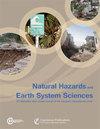Enabling dynamic modelling of coastal flooding by defining storm tide hydrographs
IF 4.7
2区 地球科学
Q1 GEOSCIENCES, MULTIDISCIPLINARY
引用次数: 0
Abstract
Abstract. Coastal flooding is driven by the combination of (high) tide and storm surge, the latter being caused by strong winds and low pressure in tropical and extratropical cyclones. The combination of storm surge and the astronomical tide is defined as the storm tide. To gain an understanding of the threat posed by coastal flooding and to identify areas that are especially at risk, now and in the future, it is crucial to accurately model coastal inundation. Most models used to simulate the coastal inundation scale follow a simple planar approach, referred to as bathtub models. The main limitations of this type of models are that they implicitly assume an infinite flood duration, and they do not capture relevant physical processes. In this study we develop a method to generate hydrographs called HGRAPHER, and we provide a global dataset of storm tide hydrographs based on time series of storm surges and tides derived from the Global Tide and Surge Model (GTSM) forced with the ERA5 reanalysis wind and pressure fields. These hydrographs represent the typical shape of an extreme storm tide at a certain location along the global coastline. We test the sensitivity of the HGRAPHER method with respect to two main assumptions that determine the shape of the hydrograph, namely the surge event sampling threshold and coincidence in the time of the surge and tide maxima. The hydrograph dataset can be used to move away from planar inundation modelling techniques towards dynamic inundation modelling techniques across different spatial scales.通过定义风暴潮过程线实现沿海洪水的动态建模
摘要沿海洪水是由(高潮)和风暴潮共同驱动的,后者是由热带和温带气旋的强风和低压引起的。风暴潮和天文潮的结合被定义为风暴潮。为了了解沿海洪水造成的威胁,并确定现在和未来特别危险的地区,准确模拟沿海洪水至关重要。大多数用于模拟沿海淹没规模的模型都遵循一种简单的平面方法,称为浴缸模型。这类模型的主要局限性在于,它们隐含地假设了有限的洪水持续时间,并且没有捕捉到相关的物理过程。在这项研究中,我们开发了一种生成过程线的方法,称为HGRAPHER,我们提供了一个基于风暴潮和潮汐时间序列的风暴潮过程线全球数据集,该数据集源自全球潮汐和涌潮模型(GTSM),该模型采用ERA5再分析风场和压力场。这些水文图代表了全球海岸线上某个位置极端风暴潮的典型形状。我们根据确定过程线形状的两个主要假设来测试HGRAPHER方法的灵敏度,即浪涌事件采样阈值以及浪涌和潮汐最大值时的发生率。水文数据集可用于从平面淹没建模技术转向不同空间尺度的动态淹没建模技术。
本文章由计算机程序翻译,如有差异,请以英文原文为准。
求助全文
约1分钟内获得全文
求助全文
来源期刊
CiteScore
7.60
自引率
6.50%
发文量
192
审稿时长
3.8 months
期刊介绍:
Natural Hazards and Earth System Sciences (NHESS) is an interdisciplinary and international journal dedicated to the public discussion and open-access publication of high-quality studies and original research on natural hazards and their consequences. Embracing a holistic Earth system science approach, NHESS serves a wide and diverse community of research scientists, practitioners, and decision makers concerned with detection of natural hazards, monitoring and modelling, vulnerability and risk assessment, and the design and implementation of mitigation and adaptation strategies, including economical, societal, and educational aspects.

 求助内容:
求助内容: 应助结果提醒方式:
应助结果提醒方式:


